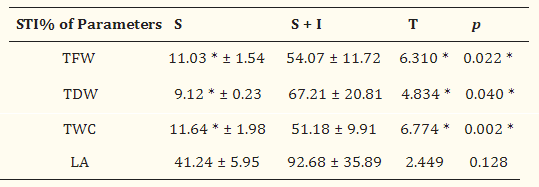A group from Department of Botany and Microbiology, Faculty of Science, Alexandria University, Alexandria 21511, Egypt, etc. has reported about alleviation of salinity stress in eggplants by using a biofertilizer.
https://www.ncbi.nlm.nih.gov/pmc/articles/PMC8912713/
Chemical fertilizers have been widely used to achieve maximum crop productivity in conventional agricultural systems. Nevertheless, when chemical fertilizers exceed the threshold level, they accelerate soil acidification, pollute groundwater, and harm the environment overall. It is recommended to apply biofertilizers as eco-friendly alternatives as they play a pivotal role in phosphate solubilization, nitrogen fixation, production of ammonia, enzymes, siderophores, and secretion of variable phytohormones. Furthermore, they exhibit biocontrol activity against a wide variety of phytopathogenic agents.
In this study, the effect of selected bioinoculum (plant growth promoting rhizobcteria and rhizo fungi) on salinity stress in eggplants (Solanum melongena L.) was investigated as a biofertilizer.
Comparative experimental conditions were as follows:
(C): one irrigated with distilled water as a control,
(I): the second one inoculated with the selected inoculum and irrigated with distilled water,
(S): the third one irrigated with 200 mM NaCl, and
(S + I): the fourth one irrigated with 200 mM NaCl and inoculated with selected inoculum.
Two strains of rhizobacteria (Bacillus subtilis and Pseudomonas sp.) and three strains of rhizofungi (Trichoderma harzianum, Aspergillus terrus, and Penicillium citrinum) were used as the inoculum (as a biofertilizer).
Salinity stress significantly decreased leaf area, root fresh and dry weights, in addition to root water content by (59.14, 95.87, 96.30, and 95.66%, respectively) compared to control, but the inoculating the soil of salt-stressed eggplants showed a significant increase in leaf area (LA), total fresh weight (TFW), total dry weight (TDW), and total water content(TWC) as shown below.

The gene expression of photosystem II D2, glutathione reductase, and glutathione S transferase was upregulated in inoculated salt-stressed eggplants with respect to stressed ones, that of protease I and protease II (cell-wall degrading enzymes to suppress pathogen growth) was also upregulated in inoculated salt-stressed eggplants with respect to stressed ones, and that of lipase was downregulated conversely in inoculated salt-stressed eggplants with respect to stressed ones.
These changes suggest that defense mechanism related genes are upregulated in inoculated eggplants.
